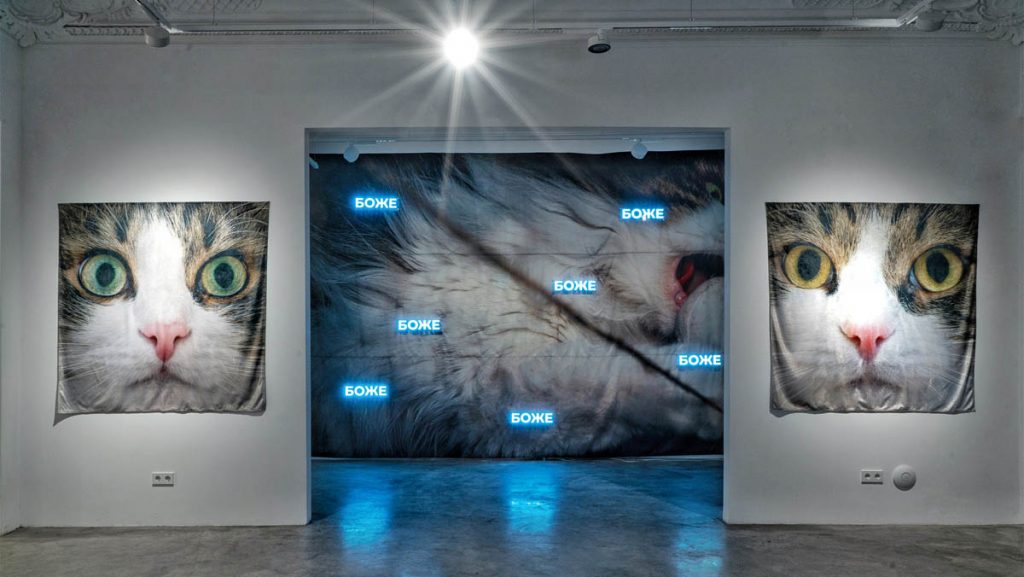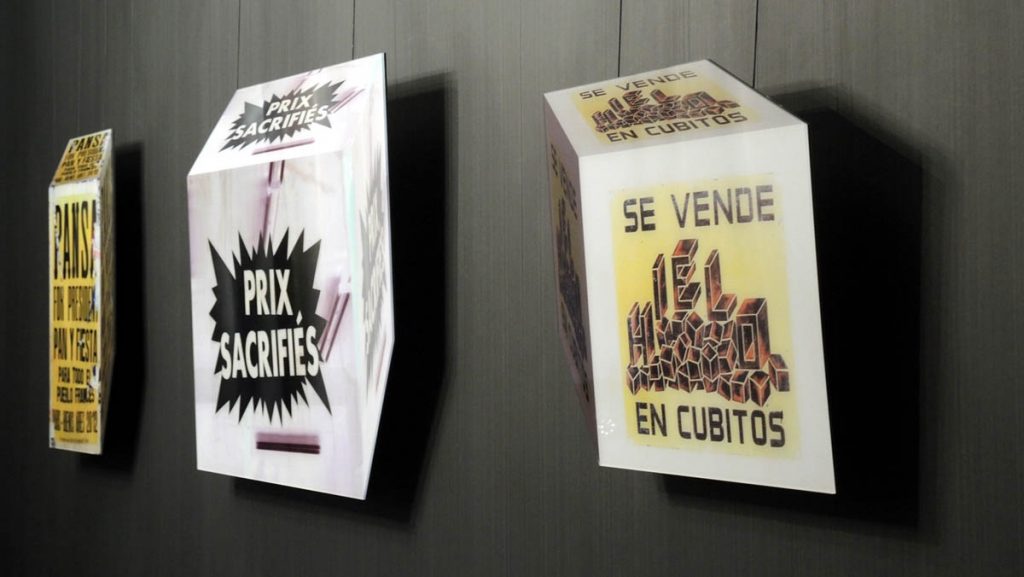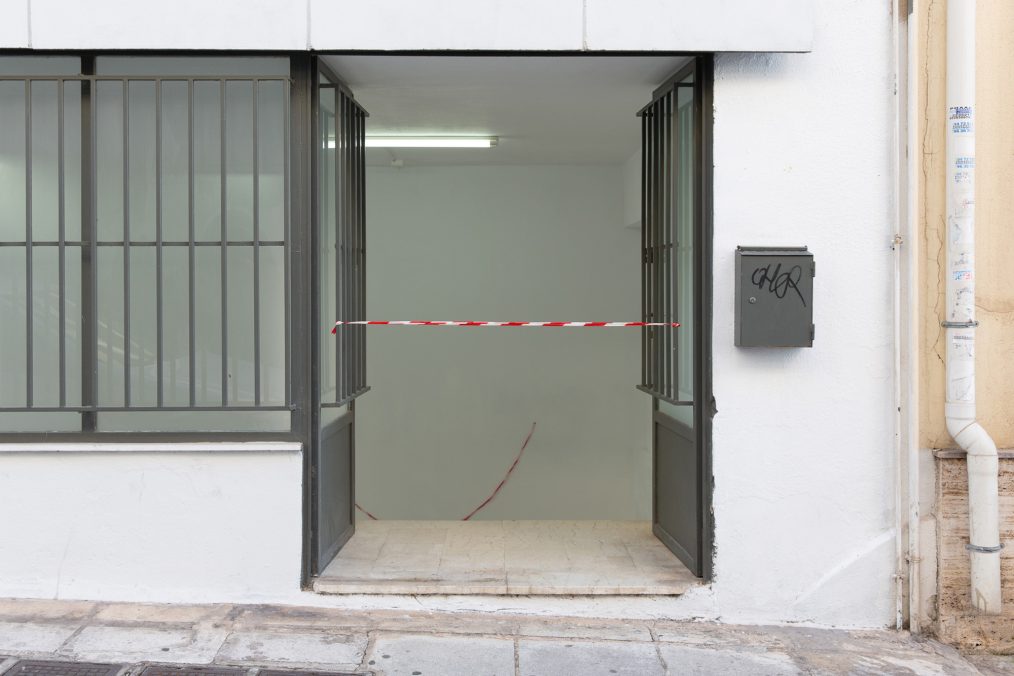
CLOSING SOON because each made exhibition has only a duration of few days. After the opening, the exhibition literally closes soon. The name is then a way for communicating the precarious conditions of an exhibition program, made in such uncertain times. Last for activating people to visit it soon. The space is not closed with locks, secured with cameras, no expensive security companies have been contracted, but the founders of the space are truly art custodians. They protect in a different way. They have not landed as a foreign body in the neighborhood, they live with it organically.
When asking Jason, one of the founders of CLOSING SOON, about one of his preferred activities in the neighborhood, he says: „Every Wednesday, a Farmers‘ market/People’s market takes place on the street next to the exhibition space. The usually quiet area turns into a crowded bazaar for all kinds of products, full of DIY solutions and colorful kiosks. Every time this market occurs, our space takes a bit of the charm and the energy of that beautiful social tradition.“ For looking exactly where they are, direct yourself to google maps. There one can view also the typical streets of Petralona Quartier.
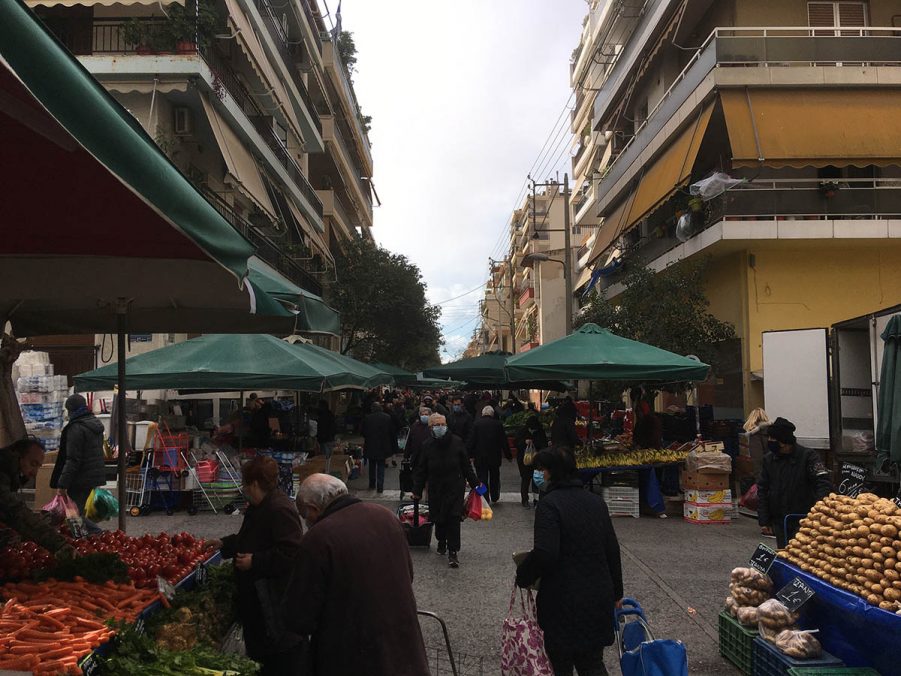
Photo: Jason Faulter, Laiki Agora, 2021 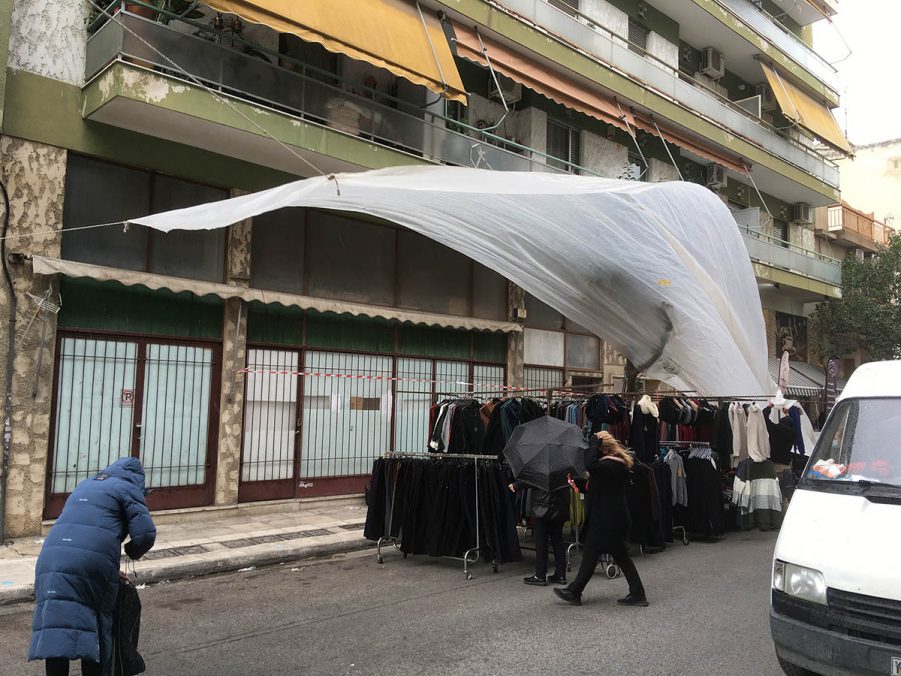
Photo: Jason Faulter, Laiki Agora, 2021
*Artists, galleries, unbranded or branded spaces, collections are asked about their respective city-sounds or mundane audio from their daily lives, just en passant with their cellphones. Every time the results are unexpected and exciting. This time we experience Athens.
How came into life closing soon?
Jason Faulter: We rented the space with some friends and colleagues three years ago, with the intention to use it as our studio. Later on, some of them left, other ones joint and a year ago, we decided to share the space with ERGO collective (a multidisciplinary team of creators) and run our two parallel programs under the same space. Sharing the space was not only a strategy for a more sustainable financial structure. Both the activities of ERGO collective and CLOSING SOON are happening sporadically, thus renting a space alone in order to host few events per year felt like a waste a space for the sake of an unnecessary claim for ownership.
Sharing the space was not only a strategy for a more sustainable financial structure. Both the activities of ERGO collective and CLOSING SOON are happening sporadically, thus renting a space alone in order to host few events per year felt like a waste a space for the sake of an unnecessary claim for ownership.
Instead, we decided to leave the physical space “unbranded”, avoiding any label or signage and trying to learn from our coexistence.
The first exhibition has an Italian title „Drammi Passaggeri“, and quite a few artists that CLOSING SOON have been showing till now are of Italian origin. How did this Italian connection evolve?
J.F: I moved to Milan for the first time in 2010, and since then, it is a constant reference and return point to me. In Italy, I met some of the most brilliant persons, friends, and colleagues. Despite the distance, we still grow together, maintaining a creative dialogue and essential relationships.
How is the situation of the pandemic in Greece?
J.F: In Greece, there is a strict lockdown since November 7th. Wearing a mask is mandatory everywhere in public (indoors and outdoors). People are allowed to leave their homes only for specific reasons and must notify authorities by sending an SMS. Additionally, there is a night curfew from 9 pm till 5 am. Events are not allowed.
Was the previews exhibition Windows maybe a reaction toward the current situation?
J.F: In a way yes. It was a series of screenings for passers-by. We were showing the work of 8 artists, all of them had the video format. Each of the selected videos uses a rather quiet language, and I thought they require time and space to breathe outside of a playlist’s linear and rigid structure, thus we decided to show in loop one video per day. They have a minimum production, own a poetic language, deal with situations and subjects relevant to the pandemic context. During the screening, the door was closed, and there was no one inside of the exhibition space. The window of the gallery was open only for two hours a day. In this context, the grill of the window gets a meaning as well, making the exhibition space look like a prison, while the current dynamic is exactly the opposite, freedom inside, severe restrictions outside.
In this context, the grill of the window gets a meaning as well, making the exhibition space look like a prison, while the current dynamic is exactly the opposite, freedom inside, severe restrictions outside.
*The name of the shown video are spellbinding: Yard, Take-off test, She/ Swimming, Handshake (60 minutes), Mouth, Slow Rush Pendeulum, Disco drum machine, The Expanding Universe.
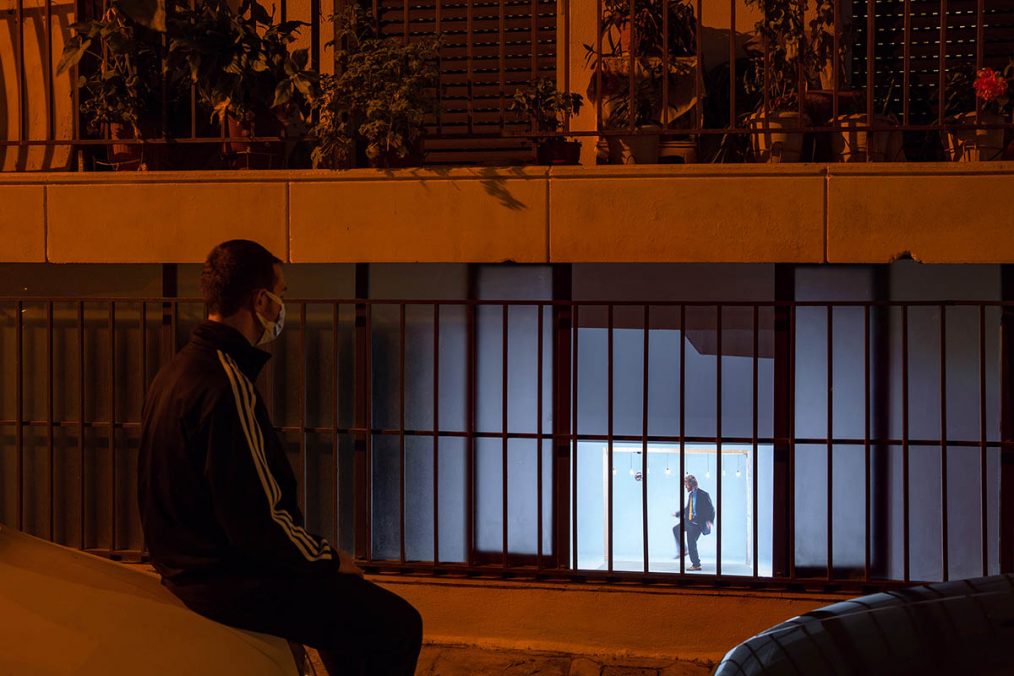
Exhibition View, Windows, a series of screenings for passers-by 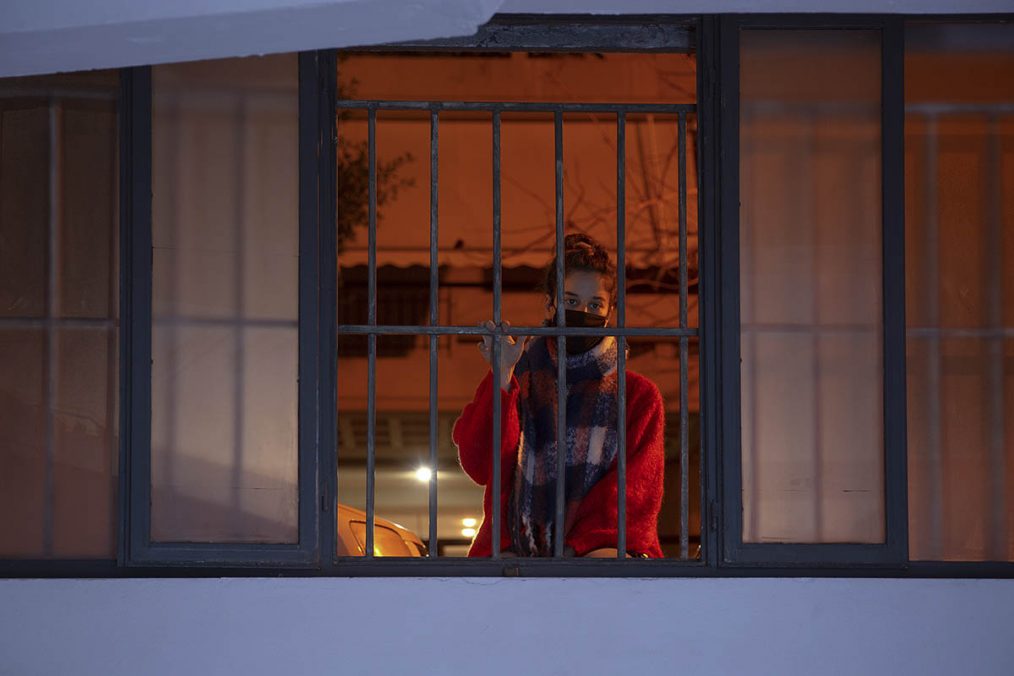
Exhibition View, Windows, a series of screenings for passers-by 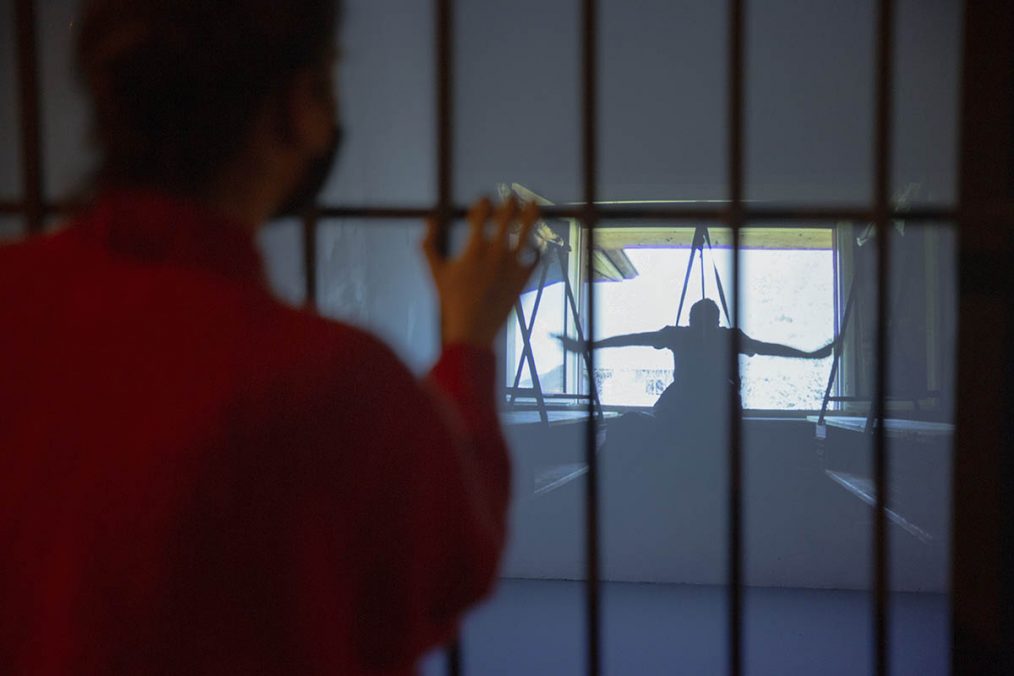
Exhibition View, Windows, a series of screenings for passers-by
You were mentioning minimum and poetic language. These are also words that are highlighted and can be read a few times on the website. Can you explain a bit the approach?
J.F: I have the feeling that the less the production of an artwork is present, the more the poetic aspect of it can emerge. I’m interested in subtle and suggestive gestures, and I like when works result through subtraction, modification, and dislocation of already existing objects or architectural elements. I’m seeking practices that reflect an attention to what is called economy of means and artists that use as many elements as necessary but as few as possible. I’m seeking practices that reflect an attention to what is called economy of means and artists that use as many elements as necessary but as few as possible. This working method allows artists to reduce the production costs and storage needs. It can also be seen as a conceptual and pragmatic response to the current overproduction of objects and images that somehow ask to think twice before adding a new one.
Is the space controlled or unobserved?
J.F: In the last exhibition for example, no one was inside during the screening. I liked the idea of letting the situation unobserved and uncontrolled and also allow the relationship between passers-by, open window, and screening to develop undisturbed by anyone’s else presence. The space is surrounded by windows, and therefore passers-by would be able to notice any human presence inside, and I wanted to avoid this extra layer of interaction.
Many art galleries invest a lot of money to secure video surveillance the space because of their artworks and warehouse. In your case, these types of equipment or need do not exist. How you find the aesthetic of metal grills?
J.F: Metal grills are common in Greece and are part of the urban landscape. Protective structures and security tools are signs of fear, and I think there is not much to like about them. The metal grill is a dominant part of the architecture of the building and somehow force us to consider it in the creative process. In our case, there is no need to protect anything. If you ask me, I would be up for removing the grill yesterday. Art galleries and other commercial activities have different needs and run another kind of risk. Probably, our metal grill wouldn’t secure them much either.
Art galleries and other commercial activities have different needs and run another kind of risk. Probably, our metal grill wouldn’t secure them much either.
The current exhibition is entitled FEELINGS (27.01.2021 – 30.01.2021, from 08 – 10 o’clock), what will it be exhibited and who is the artist?
J.F: The artist is Orestis Mavroudis. The works consist exclusively of safety ribbons (standard red-white striped) , which has been removed mostly from the streets in Athens and were relocated in the exhibition space. Such safety ribbons got extensively used lately to indicate canceled places and suggested distances due to the new regulations. It seems to be a universal language, a convention that regulates access and movement and there is an overuse of it during the covid era.
Such safety ribbons got extensively used lately to indicate canceled places and suggested distances due to the new regulations. It seems to be a universal language, a convention that regulates access and movement and there is an overuse of it during the covid era.
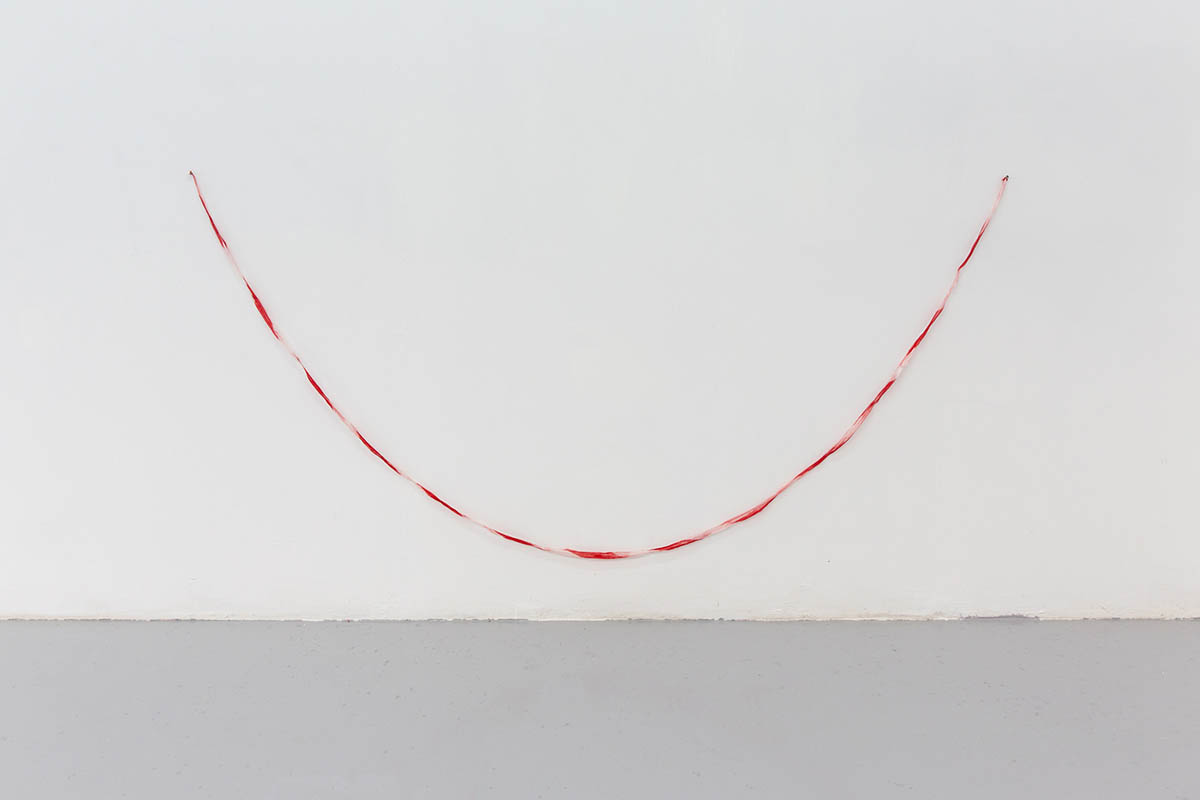
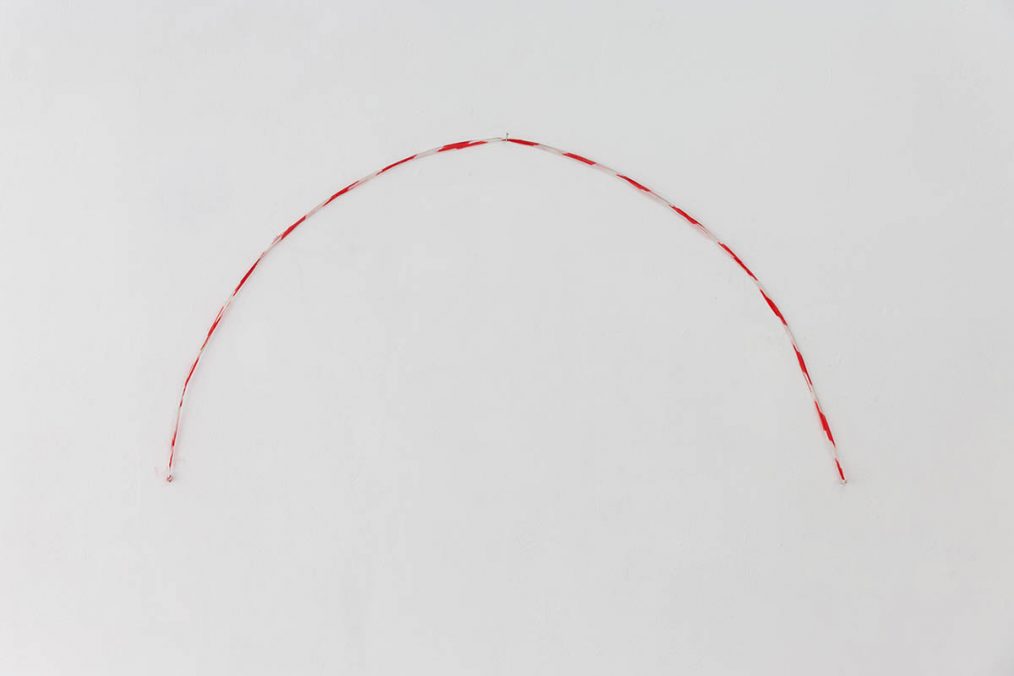
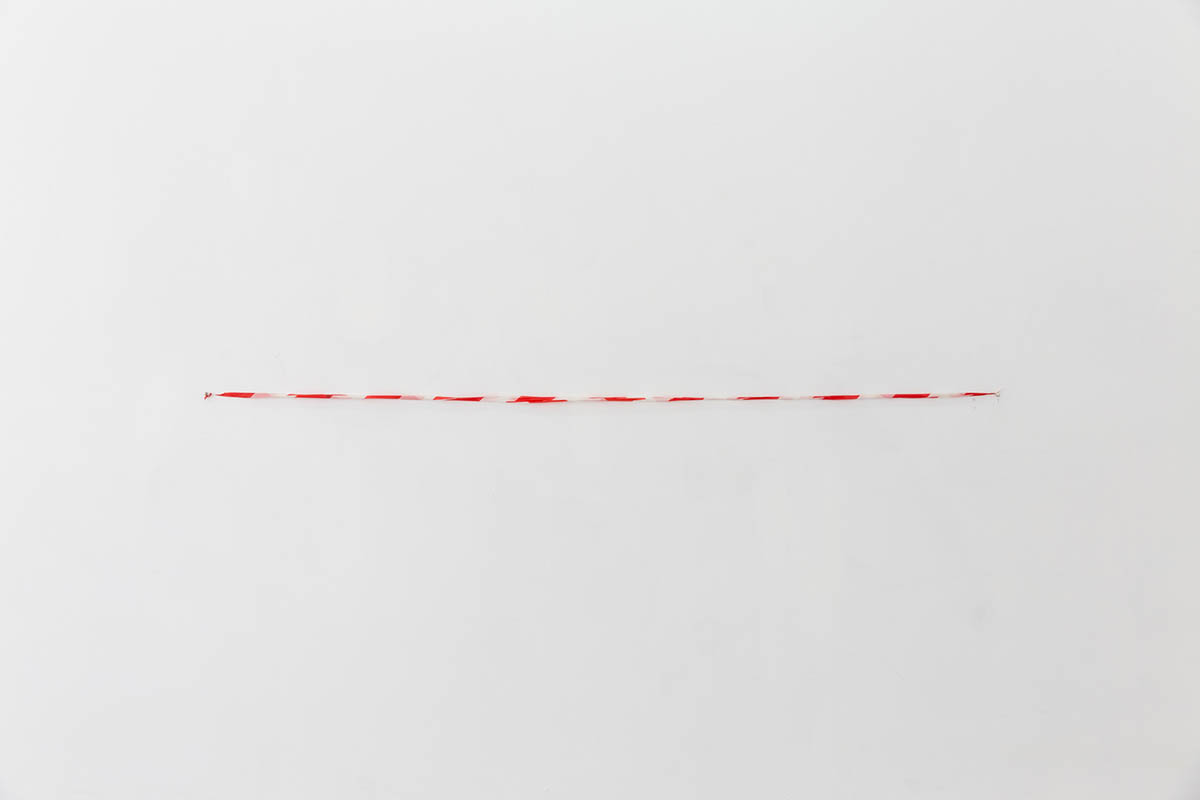
Photo: Nikos Katsaros
The exhibition focuses on three different shapes that the ribbon takes depending on the interaction of humans with it. It’s an attempt to connect obedience with feelings as expressed through the forms that such interactions create. One of the ribbons has been placed at the entrance door, to indicate that entering is not allowed, while the door will remain wide open. Thus, the exhibition will be visible from the outside, both from the open door and the open window.
What are the future plans of closing soon?
J.F: The future plans include two more solo shows in March and June, and soon I hope I’ll be able to communicate more details about them.
Dear Jason Faulter, I thank you for this thoughtful, inspiring Conversation. The way how CLOSING SOON operates has made me think a lot – the poetic aspects, the avoidance of ownership claims, the sustainable financial side. I hope that I will be able to visit a day the quartier and see from the window grill one of CLOSING SOON future exhibitions. Then hope to meet all of you there for a cigarette and a Greek Frappe. If in Greece, you (the reader) can be a passer-by as well.
Address and Contact:
CLOSING SOON
Egiidon 31, 118 53 Athens
www.closingsoon.gr
CLOSING SOON is an artist-run space dedicated to minimum production. It hosts exhibitions that focus on subtraction, alteration and dislocation as artistic values, encouraging practices that use a plain yet evocative language. CLOSING SOON is open to works that delve into the possibilities of creation with as many elements as are necessary, but as few as possible. This working method minimizes the production costs and the storage needs; and it can be seen as a pragmatic, as well as a conceptual response to the current overproduction of objects and images. The purpose of the main exhibition program is to support artists presenting their first solo shows in Athens, challenging them to reduce their research to the most essential dimension and treat the exhibition space as a field of experimentation. Using diverse exhibition and screening formats, the intention is to merge young, underrepresented, as well as established artists with a variety of backgrounds and nationalities. CLOSING SOON runs on a self-financed basis and when possible, the production materials are sourced through arrangements and agreements made between the team of CLOSING SOON and a network of friends and collaborators. CLOSING SOON is often supported by in-kind contributions and the goal is to provide the exchange of goods and services, and avoid any acquisition outside of this economy.
Cornelius Wildner (*1970) is a Vienna-based sound artist and music technologist. He deals with ephemeral sounds, field recordings, archiving, live performance, analog and digital synthesis. At the same time, he collaborates with artists from different genres – https://linktr.ee/wildner
About the Interviewer: Erka Shalari (*1988, Tirana) is a Vienna-based art author. She focuses on discovering unique artistic positions, unconventional exhibition spaces, and galleries that have deliberately broken new ground in their working methods. In this regard, she relies on unorthodox publishing practices, coupling these with a nonchalant manner of writing. The work oscillates between articles for magazines, exhibition texts and press releases – https://linktr.ee/erkashalari



